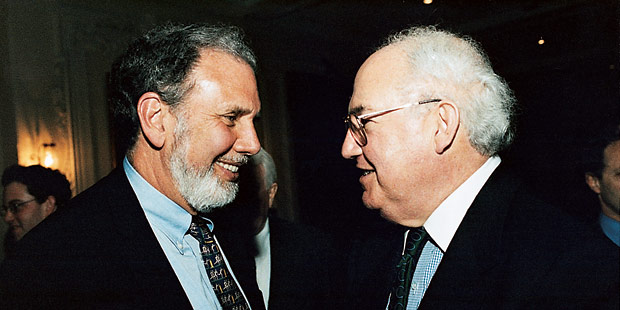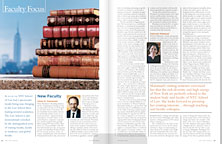Annual Survey Honors Sexton
Printer Friendly VersionJohn Sexton, NYU president, was recently presented with an award that has an impressive lineage—past honorees include U.S. Supreme Court Justices Harry Blackmun, William Brennan, Ruth Bader Ginsburg, Thurgood Marshall, Sandra Day O’Connor, and John Paul Stevens; former Attorney General Janet Reno; and Archbishop Desmond Tutu. As the honoree of the Annual Survey of American Law’s spring issue, Sexton was the focus of one of the most prestigious occasions at NYU School of Law.
At the event, Professor Harold Koh of Yale; R. May Lee (’90), founder and chief executive officer of MarketBoy and a trustee of the Law School; Professor Arthur Miller of Harvard; NYU School of Law Professor William Nelson (’65); Judge Sonia Sotomayor of the U.S. Court of Appeals for the Second Circuit; Professor Susan Stabile of St. John’s University; and, by video, Judge Guido Calabresi of the U.S. Court of Appeals for the Second Circuit and Senator Hillary Rodham Clinton gave tributes to the guest of honor. The audience included notable professors, judges, lawyers, university trustees, and students.
Dean Richard Revesz gave a traditional welcome to Herbert Hirschhorn (’32), one of the Law School’s oldest alumni, and introduced the Annual Survey editor-in-chief Rachel Chanin (’03). Each year, Chanin explained, the spring issue of the Annual Survey is dedicated to an outstanding figure in American law.
Stabile began what would become a comical hour-and-a-half by saying, “Most of the stories I can tell you, John could tell you better himself.” Stabile described her first meeting with a “young and at least relatively attractive” Sexton, who was then the coach of her high school debate team. She described him as “my friend, my mentor, and my second father.”
The next tribute, from Miller, Sexton’s teacher at Harvard, was uncharacteristically emotional and lined with humor. Miller said that his is a world of a small number of great friends. “I have very few friends, not like John,” he said. “What I really think is that John is the brother I never had.”
He offered anecdotes suggesting that he and his former student have not always had such a harmonious relationship. In Miller’s Civil Procedure class, Sexton was a live-wire of a student, right from day one. “[It was] cheek and jowl,” Miller said. “Hand-to-hand combat. . .mano a mano.” Following this first class, Sexton went to Miller’s office to make amends, “and then for the first time, but not the last time, I heard his immortal words,” said Miller. “‘You’re the greatest, you’re the man.’ ”
Miller appointed Sexton to teach a segment of a course on supplemental jurisdiction in his second and third years of law school. One of his first students was Koh.
“It was with great bemusement that we watched this bearded Paul Bunyan of a man teach Civil Procedure,” said Koh, who found his young professor inspiring. “Your success was his success, your learning was his triumph.”
He recalled when Sexton encouraged a tentative student by saying, “Let it out big fella. I know it’s in there!” When the student finally blurted out his comment, Koh said, “John bear hugged him and we all cheered.” Nelson shared some admiring words about Sexton’s capacities as a dean. “He helped us individually, and he demanded that we make a commitment to build an institution far greater than the sum of its individual parts,” Nelson explained. Clinton focused on “John’s vision and devotion to the public service.”
Lee said that it was not until she met Sexton that she realized “law and lore were actually homonyms, which seems appropriate in John’s lexicon.” She also spoke about his sincerity. “You might tend to think that his gestures are excessive and ungenuine, but it’s not true,” she said. “John’s dreams are big enough for us all. When we share his dreams, we work a little harder, do a little better, and become a better person.”
Sotomayor praised Sexton’s dedication to the Root-Tilden-Kern Scholarship Program. Calabresi added that Sexton, as a dean who understood American history, has a deep capacity for legal scholarship and an evident love of people that is “more nearly unique than rare.”
Last to speak was the event honoree himself, who modestly attributed his success as dean to mechanisms that were already in place at NYU School of Law. He referenced a conversation he once had with James Vorenberg, then dean of Harvard Law School, who called to congratulate him when he was first appointed.
“John, we’re proud of you,” Vorenberg said. “We want to assure you that not even a person of your formidable talent will be able sink a ship as mighty as NYU School of Law.” Sexton professed his belief that “the Law School will just get better from here.”


 Multimedia
Multimedia